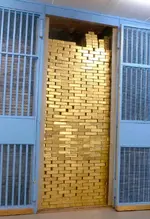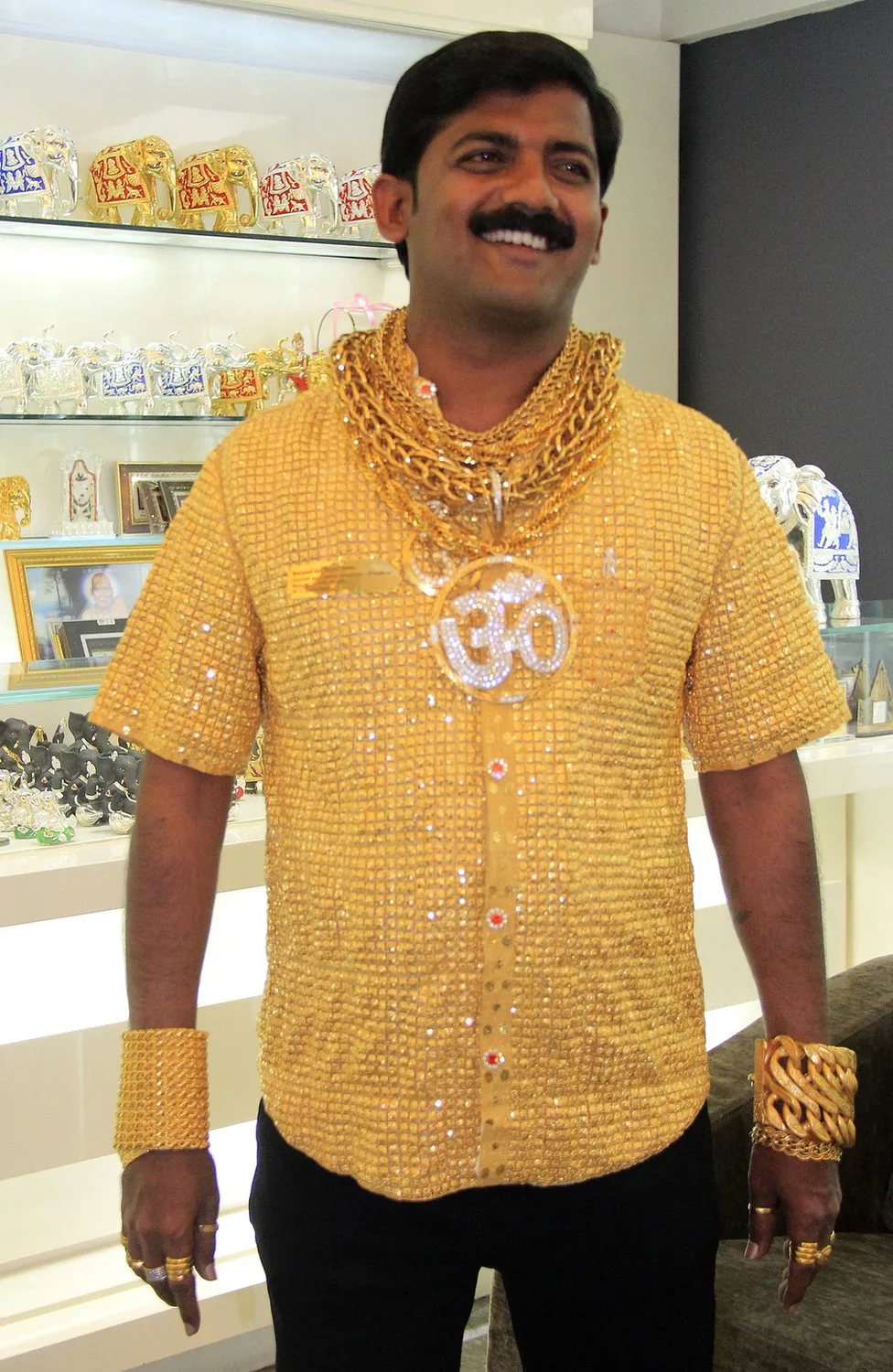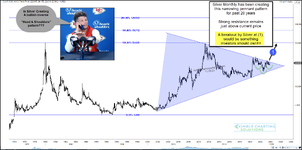You are using an out of date browser. It may not display this or other websites correctly.
You should upgrade or use an alternative browser.
You should upgrade or use an alternative browser.
Precious Metals
- Thread starter president
- Start date
Whoever decided to stack the gold bars that way has no idea what he's doing. Very dangerous, very unpractical, and the bottom ones will all get crushed or deformed.
It's the Federal Reserve Bank of NY haha.Whoever decided to stack the gold bars that way has no idea what he's doing. Very dangerous, very unpractical, and the bottom ones will all get crushed or deformed.
What's the main way you all buy into the PM space? Physical, ETF, or stocks? Miners, royalty or streaming?
Physical; gold in my property (in a variety of small amounts and values - mixture of coins/bars) and silver in a vault in Switzerland.
The latter isn't as Bond villian-ish as it sounds, as you are liable for VAT in UK on Silver once delivered, so the company I use (bullionbypost) stores it - for a small charge.
The silver is a more an investment but the Gold is a hedge and a worse case SHTF scenario currency.
Both comprise less than 10% of my portfolio for context, though ideally should have been more. I personally wouldn't trust any one with my Gold.
The latter isn't as Bond villian-ish as it sounds, as you are liable for VAT in UK on Silver once delivered, so the company I use (bullionbypost) stores it - for a small charge.
The silver is a more an investment but the Gold is a hedge and a worse case SHTF scenario currency.
Both comprise less than 10% of my portfolio for context, though ideally should have been more. I personally wouldn't trust any one with my Gold.
Last edited:
Someone posted this on RVF regarding storing of PMs. Thought it was worth preserving.
The most secure safe is one bolted to the floor, or one cast into the floor. Few criminals know how to open safes quickly, but they will haul it off and beat it with sledge hammers until it opens. So unless it is too heavy to move, bolt it down or surround it with concrete.
The better safes are UL rated for fire and burglar protection. If you want one that can not readily be opened by a burglar, look for a TL rating by the Underwriters Laboratory. TL-15 means a semi-skilled burglar with tools will likely take 15 minutes to get into it, etc. TL-15 and TL-30 safes would typically be for jewelry and may be required to get insurance coverage of high-value collections. Run-of-the mill safes will not be UL rated at all.
A safe should be the last layer of security. No high security facility depends only on a safe, it is layer after layer to deter, detect, and delay.
Keep the safe a secret and give no one a reason to think there is a high value item in the house. Have motion lights, cut back shrubbery, etc. Interior lights on timers. Reinforce door jams. Make sure all windows lock securely. Upgrade locks--have a locksmith add mushroom and anti-bump pins to lock cylinders, have them go with maximum MACS (a locksmith will know what that means) for the pinning, and go with an odd-ball 6-pin keyway if possible--that will thwart most picking and almost all bumping attacks. A less common Sargent, Corbin-Russwin, Yale, etc., keyway can be substituted for the ubiquitous Schlage SC1 and Kwikset KW1 keyways in some deadbolts and some key-in-knob lockets. Go with a "paracentric" (i.e., wiggly) keyway. Or go with a better lock (Schlage Primus, etc.) There is an exploitable flaw with the Kwikset "Smart Key" locks and I would personally stay away from them. And go with grade 1 or grade 2 lock hardware. Make sure dead bolts extend all they way into door frames--they do not really lock until the bolt fully extends. Door knobs that lock need to have their strike plates adjusted right so the dead lock feature works so the can not be carded open. For doors that open outwards, there are ways to secure them so hinges can not be removed. For sliding doors, do not have them, but if you are stuck with one, put large-headed screws in above the sliding door so it can not be lifted up out of the track. And add an auxiliary lock to it. Personally, I would remove any garage door emergency release cords.
Have a video system pushing notifications when motion is triggered, and have the DVR in a hidden area. Get a big dog. Have a security system. There are still some you can install yourself. Should have a sensor on every door and window and a glass-break detector on any large areas of glass. Go with cellular communications back to the monitoring company. If you go the do-it-yourself route you can get monitoring for around $10 a month.
If they get past all that, then for a safe, again, bolt it down. Hide it best you can. In one house we had, the safe was in a nook in the basement behind a stack of moving boxes. Beyond that, may want to secure any tools in your workshop that could be used to breach it (drills, angle grinders, cutting torches, etc.) Given a choice, put the safe in a corner where the door opens adjacent to a wall -- harder to use pry bars on it that way. For a better safe, get one that has thick hard plate and multiple relockers. Hardplate tears up drill bits and relockers will fire when a safe is messed with, and then it takes a safe tech, a pile of drills, and a lot of swearing to ever get the thing open again. When people go to the big box store to buy a safe they might be impressed by a lot of large diameter locking bolts. Those are not the issue. You need to take the back panel off the door and see what is going on under the hood. There needs to be a lot of hard plate to protect the lock. Thick steel is not really the issue--with the right drill bit you can go through steel like butter. Hardplate is what is needed. Hardplate destroys drill bits.
I would prefer a good quality mechanical combination over an electronic one. Nearly all electronic locks can be opened quickly by safe techs with certain tools. Those tools are only sold within the industry, and I have heard no reports of criminals getting them, but it could happen. A quality combination lock has no quick way to unlock it without the combination. Safe cracking in movies, where they dial in the combination by feel, is nonsense. Mechanical locks can be manipulated open, but it is not a quick process--it usually takes hours. If one is really worried about it, get an S&G 8410 -- rated for 20 hours of manipulation effort. Or get a Kaba-Mas X-10 lock, although it is electronic, there is no known method of getting past it other than destructive means. But unless you have something incredibly valuable those two locks would be expensive overkill.
The most secure safe is one bolted to the floor, or one cast into the floor. Few criminals know how to open safes quickly, but they will haul it off and beat it with sledge hammers until it opens. So unless it is too heavy to move, bolt it down or surround it with concrete.
The better safes are UL rated for fire and burglar protection. If you want one that can not readily be opened by a burglar, look for a TL rating by the Underwriters Laboratory. TL-15 means a semi-skilled burglar with tools will likely take 15 minutes to get into it, etc. TL-15 and TL-30 safes would typically be for jewelry and may be required to get insurance coverage of high-value collections. Run-of-the mill safes will not be UL rated at all.
A safe should be the last layer of security. No high security facility depends only on a safe, it is layer after layer to deter, detect, and delay.
Keep the safe a secret and give no one a reason to think there is a high value item in the house. Have motion lights, cut back shrubbery, etc. Interior lights on timers. Reinforce door jams. Make sure all windows lock securely. Upgrade locks--have a locksmith add mushroom and anti-bump pins to lock cylinders, have them go with maximum MACS (a locksmith will know what that means) for the pinning, and go with an odd-ball 6-pin keyway if possible--that will thwart most picking and almost all bumping attacks. A less common Sargent, Corbin-Russwin, Yale, etc., keyway can be substituted for the ubiquitous Schlage SC1 and Kwikset KW1 keyways in some deadbolts and some key-in-knob lockets. Go with a "paracentric" (i.e., wiggly) keyway. Or go with a better lock (Schlage Primus, etc.) There is an exploitable flaw with the Kwikset "Smart Key" locks and I would personally stay away from them. And go with grade 1 or grade 2 lock hardware. Make sure dead bolts extend all they way into door frames--they do not really lock until the bolt fully extends. Door knobs that lock need to have their strike plates adjusted right so the dead lock feature works so the can not be carded open. For doors that open outwards, there are ways to secure them so hinges can not be removed. For sliding doors, do not have them, but if you are stuck with one, put large-headed screws in above the sliding door so it can not be lifted up out of the track. And add an auxiliary lock to it. Personally, I would remove any garage door emergency release cords.
Have a video system pushing notifications when motion is triggered, and have the DVR in a hidden area. Get a big dog. Have a security system. There are still some you can install yourself. Should have a sensor on every door and window and a glass-break detector on any large areas of glass. Go with cellular communications back to the monitoring company. If you go the do-it-yourself route you can get monitoring for around $10 a month.
If they get past all that, then for a safe, again, bolt it down. Hide it best you can. In one house we had, the safe was in a nook in the basement behind a stack of moving boxes. Beyond that, may want to secure any tools in your workshop that could be used to breach it (drills, angle grinders, cutting torches, etc.) Given a choice, put the safe in a corner where the door opens adjacent to a wall -- harder to use pry bars on it that way. For a better safe, get one that has thick hard plate and multiple relockers. Hardplate tears up drill bits and relockers will fire when a safe is messed with, and then it takes a safe tech, a pile of drills, and a lot of swearing to ever get the thing open again. When people go to the big box store to buy a safe they might be impressed by a lot of large diameter locking bolts. Those are not the issue. You need to take the back panel off the door and see what is going on under the hood. There needs to be a lot of hard plate to protect the lock. Thick steel is not really the issue--with the right drill bit you can go through steel like butter. Hardplate is what is needed. Hardplate destroys drill bits.
I would prefer a good quality mechanical combination over an electronic one. Nearly all electronic locks can be opened quickly by safe techs with certain tools. Those tools are only sold within the industry, and I have heard no reports of criminals getting them, but it could happen. A quality combination lock has no quick way to unlock it without the combination. Safe cracking in movies, where they dial in the combination by feel, is nonsense. Mechanical locks can be manipulated open, but it is not a quick process--it usually takes hours. If one is really worried about it, get an S&G 8410 -- rated for 20 hours of manipulation effort. Or get a Kaba-Mas X-10 lock, although it is electronic, there is no known method of getting past it other than destructive means. But unless you have something incredibly valuable those two locks would be expensive overkill.
Even though I make fun of it (gold) all the time, I just bought some quality miners. Why not, they stink to high hades right now, so if there is any time to buy, it's now. Of course, by the orange thing, as it will do much better regardless, but there are reasons to be in gold too.
Someone posted this on RVF regarding storing of PMs. Thought it was worth preserving.
The most secure safe is one bolted to the floor, or one cast into the floor. Few criminals know how to open safes quickly, but they will haul it off and beat it with sledge hammers until it opens. So unless it is too heavy to move, bolt it down or surround it with concrete.
The better safes are UL rated for fire and burglar protection. If you want one that can not readily be opened by a burglar, look for a TL rating by the Underwriters Laboratory. TL-15 means a semi-skilled burglar with tools will likely take 15 minutes to get into it, etc. TL-15 and TL-30 safes would typically be for jewelry and may be required to get insurance coverage of high-value collections. Run-of-the mill safes will not be UL rated at all.
A safe should be the last layer of security. No high security facility depends only on a safe, it is layer after layer to deter, detect, and delay.
Keep the safe a secret and give no one a reason to think there is a high value item in the house. Have motion lights, cut back shrubbery, etc. Interior lights on timers. Reinforce door jams. Make sure all windows lock securely. Upgrade locks--have a locksmith add mushroom and anti-bump pins to lock cylinders, have them go with maximum MACS (a locksmith will know what that means) for the pinning, and go with an odd-ball 6-pin keyway if possible--that will thwart most picking and almost all bumping attacks. A less common Sargent, Corbin-Russwin, Yale, etc., keyway can be substituted for the ubiquitous Schlage SC1 and Kwikset KW1 keyways in some deadbolts and some key-in-knob lockets. Go with a "paracentric" (i.e., wiggly) keyway. Or go with a better lock (Schlage Primus, etc.) There is an exploitable flaw with the Kwikset "Smart Key" locks and I would personally stay away from them. And go with grade 1 or grade 2 lock hardware. Make sure dead bolts extend all they way into door frames--they do not really lock until the bolt fully extends. Door knobs that lock need to have their strike plates adjusted right so the dead lock feature works so the can not be carded open. For doors that open outwards, there are ways to secure them so hinges can not be removed. For sliding doors, do not have them, but if you are stuck with one, put large-headed screws in above the sliding door so it can not be lifted up out of the track. And add an auxiliary lock to it. Personally, I would remove any garage door emergency release cords.
Have a video system pushing notifications when motion is triggered, and have the DVR in a hidden area. Get a big dog. Have a security system. There are still some you can install yourself. Should have a sensor on every door and window and a glass-break detector on any large areas of glass. Go with cellular communications back to the monitoring company. If you go the do-it-yourself route you can get monitoring for around $10 a month.
If they get past all that, then for a safe, again, bolt it down. Hide it best you can. In one house we had, the safe was in a nook in the basement behind a stack of moving boxes. Beyond that, may want to secure any tools in your workshop that could be used to breach it (drills, angle grinders, cutting torches, etc.) Given a choice, put the safe in a corner where the door opens adjacent to a wall -- harder to use pry bars on it that way. For a better safe, get one that has thick hard plate and multiple relockers. Hardplate tears up drill bits and relockers will fire when a safe is messed with, and then it takes a safe tech, a pile of drills, and a lot of swearing to ever get the thing open again. When people go to the big box store to buy a safe they might be impressed by a lot of large diameter locking bolts. Those are not the issue. You need to take the back panel off the door and see what is going on under the hood. There needs to be a lot of hard plate to protect the lock. Thick steel is not really the issue--with the right drill bit you can go through steel like butter. Hardplate is what is needed. Hardplate destroys drill bits.
I would prefer a good quality mechanical combination over an electronic one. Nearly all electronic locks can be opened quickly by safe techs with certain tools. Those tools are only sold within the industry, and I have heard no reports of criminals getting them, but it could happen. A quality combination lock has no quick way to unlock it without the combination. Safe cracking in movies, where they dial in the combination by feel, is nonsense. Mechanical locks can be manipulated open, but it is not a quick process--it usually takes hours. If one is really worried about it, get an S&G 8410 -- rated for 20 hours of manipulation effort. Or get a Kaba-Mas X-10 lock, although it is electronic, there is no known method of getting past it other than destructive means. But unless you have something incredibly valuable those two locks would be expensive overkill.
All very good advice. Thank you for re-posting.
However, it says nothing about the fact that someone has to deliver the safe to your house and install it, and this leaves various electronic and paper records. Also, the people who deliver and install it will also know exactly where it is.
Gold price hits six-month high:
https://www.thefinancialtrends.com/2023/11/28/gold-hits-six-month-high/
https://www.thefinancialtrends.com/2023/11/28/gold-hits-six-month-high/
So why is storing it in Switzerland a safer bet vs storing it in another country?Physical; gold in my property (in a variety of small amounts and values - mixture of coins/bars) and silver in a vault in Switzerland.
The latter isn't as Bond villian-ish as it sounds, as you are liable for VAT in UK on Silver once delivered, so the company I use (bullionbypost) stores it - for a small charge.
The silver is a more an investment but the Gold is a hedge and a worse case SHTF scenario currency.
Both comprise less than 10% of my portfolio for context, though ideally should have been more. I personally wouldn't trust any one with my Gold.
Folks in Hong Kong has been taking advantage of the arbitrage between Hong Kong and China for gold for several months now. In Hong Kong, physical spot gold prices are based on xauusd chart whereas in China, you can sell it for around 2050~.
Its looking like prices will align quite soon...
Its looking like prices will align quite soon...
JR5
Other Christian
I follow Ditch the Deep State daily : https://www.reddit.com/user/Ditch_the_DeepState/posts/ His latest charts are below.
Basically, the gold and silver vaults are getting slowly drained, but COMEX, which is has been fraudulent from its get-go, works in conjunction with the banks to keep prices suppressed so the public doesn't see gold/silver as an alternative to fiat.
It's unclear how long they can keep this charade going. There's only 42 million oz of registered COMEX silver left, a single billionaire could empty it out in a day.
I looked awhile back at how undervalued silver is compared to Roman times. The best metric was actually prostitution, and based on an analysis of prostitute prices silver is currently undervalued 144x.


Basically, the gold and silver vaults are getting slowly drained, but COMEX, which is has been fraudulent from its get-go, works in conjunction with the banks to keep prices suppressed so the public doesn't see gold/silver as an alternative to fiat.
It's unclear how long they can keep this charade going. There's only 42 million oz of registered COMEX silver left, a single billionaire could empty it out in a day.
I looked awhile back at how undervalued silver is compared to Roman times. The best metric was actually prostitution, and based on an analysis of prostitute prices silver is currently undervalued 144x.


It's just where their vaults (owned/leased by the supplier) are. Wouldn't necessary say safer although I would trust the Swiss a bit more than my own country ....So why is storing it in Switzerland a safer bet vs storing it in another country?
Only reason I don't have physical ownership of silver (as opposed to Gold) is the VAT that would then be added making trading unprofitable.
Gold was a hedge and SHTF currency; silver a bit of a hedge but will sell it back to the firm I purchased from when the price is right.
JR5
Other Christian
It is really tricky figuring out where to store physical. You can keep it in a bank security box but they're only responsible for up to $10,000 worth, and there are lots of horror stories of stolen security boxes by bank employees. You can keep it at home and bury it outside if you own your home, I guess, or keep it in a safe, preferably a bolted down one, but that opens up the possibility of theft. You can also insure your gold/silver through companies like Hugh Wood, but that isn't so cheap. There is no perfect solution, everything feels insecure.
Golds up and the future looks shiny.




